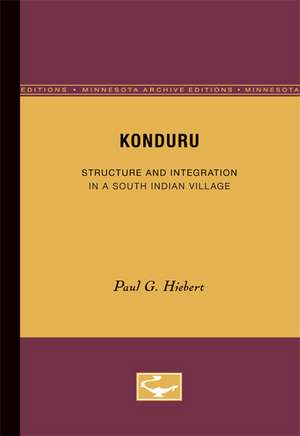Konduru: Structure and Integration in a South Indian Village
Autor Paul G. Hieberten Limba Engleză Paperback – 8 feb 1971
Konduru was first published in 1971. Minnesota Archive Editions uses digital technology to make long-unavailable books once again accessible, and are published unaltered from the original University of Minnesota Press editions.
This is a detailed anthropological description and analysis of life in Konduru, a village in the central part of southern India about one hundred miles south of Hyderabad. The study is based on field work done by Professor Hiebert over a period of several years when he lived in the village, spoke its language, Telugu, and became closely acquainted with the people and their culture.
After sketching the geographic and historical setting of the village, Professor Hiebert describes and discusses the social structure, including the societal categories, the various castes, the social groups including family, patrilineage, associations, and communities, and hamlets, villages, and towns in the region. There are chapters on status and power, networks of interpersonal relationships, panchayats (the system of justice), and rituals. Finally, the author discusses changes which are taking place in the society and culture of Konduru and presents his conclusions. He points out that this study of Konduru illustrates the importance of the village within the social order but at the same time demonstrates that the village cannot be understood apart from the other social groups in which its members are involved and interrelated, and that these relationships are neither static nor simple. But, as he concludes, the village is, for the individual, the concrete expression of his society.
The book is illustrated with photographs, maps, and drawings. E. Adamson Hoebel, Regents' professor of anthropology at the University of Minnesota, writes a foreword.
This is a detailed anthropological description and analysis of life in Konduru, a village in the central part of southern India about one hundred miles south of Hyderabad. The study is based on field work done by Professor Hiebert over a period of several years when he lived in the village, spoke its language, Telugu, and became closely acquainted with the people and their culture.
After sketching the geographic and historical setting of the village, Professor Hiebert describes and discusses the social structure, including the societal categories, the various castes, the social groups including family, patrilineage, associations, and communities, and hamlets, villages, and towns in the region. There are chapters on status and power, networks of interpersonal relationships, panchayats (the system of justice), and rituals. Finally, the author discusses changes which are taking place in the society and culture of Konduru and presents his conclusions. He points out that this study of Konduru illustrates the importance of the village within the social order but at the same time demonstrates that the village cannot be understood apart from the other social groups in which its members are involved and interrelated, and that these relationships are neither static nor simple. But, as he concludes, the village is, for the individual, the concrete expression of his society.
The book is illustrated with photographs, maps, and drawings. E. Adamson Hoebel, Regents' professor of anthropology at the University of Minnesota, writes a foreword.
Preț: 461.24 lei
Nou
Puncte Express: 692
Preț estimativ în valută:
88.26€ • 92.40$ • 73.03£
88.26€ • 92.40$ • 73.03£
Carte tipărită la comandă
Livrare economică 01-07 aprilie
Preluare comenzi: 021 569.72.76
Specificații
ISBN-13: 9780816657872
ISBN-10: 0816657874
Pagini: 208
Dimensiuni: 152 x 229 x 13 mm
Greutate: 0.34 kg
Ediția:Minnesota Archi
Editura: University of Minnesota Press
Colecția Univ Of Minnesota Press
ISBN-10: 0816657874
Pagini: 208
Dimensiuni: 152 x 229 x 13 mm
Greutate: 0.34 kg
Ediția:Minnesota Archi
Editura: University of Minnesota Press
Colecția Univ Of Minnesota Press
Notă biografică
Paul G. Hiebert was Distinguished Professor of Mission and Anthropology at Trinity Evangelical Divinity School in Deerfield, Illinois. He began teaching at Trinity in 1990. After spending three years as pastor, Dr. Hiebert served for six years with the Mennonite Brethren Board of Missions and Services in India. During that time he was principal of Bethany Bible School and College. Since then, he has taught anthropology at Kansas State University in Manhattan, Kansas, and the University of Washington in Seattle, Washington, and anthropology and missions at Fuller Theological Seminary. Dr. Hiebert also taught as a visiting professor at Mennonite Brethren Seminary and the University of Wisconsin. He was Fulbright visiting professor at Osmania University in India for one year.Dr. Hiebert published numerous articles, book reviews, and books in both anthropology and missions. Among his books in anthropology are Konduru: Structure and Integration in a South Indian Village (Univ. of Minnesota Press) and Cultural Anthropology (J.B. Lippincott 1976). Among his books in missions are Case Studies in Missions (written with his wife; Baker 1987), Anthropological Insights for Missionaries (Baker 1985), Anthropological Reflections on Missiological Issues (Baker 1995), and numerous chapters and essays in other volumes.
Textul de pe ultima copertă
Minnesota Archive Editions uses digital technology to make long-unavailable books once again accessible to scholars, students, researchers, and general readers. Rich with historical and cultural value, these works are published unaltered from the original University of Minnesota Press editions. The books offered through Minnesota Archive Editions are produced in limited quantities according to customer demand and are available through select distribution partners.
